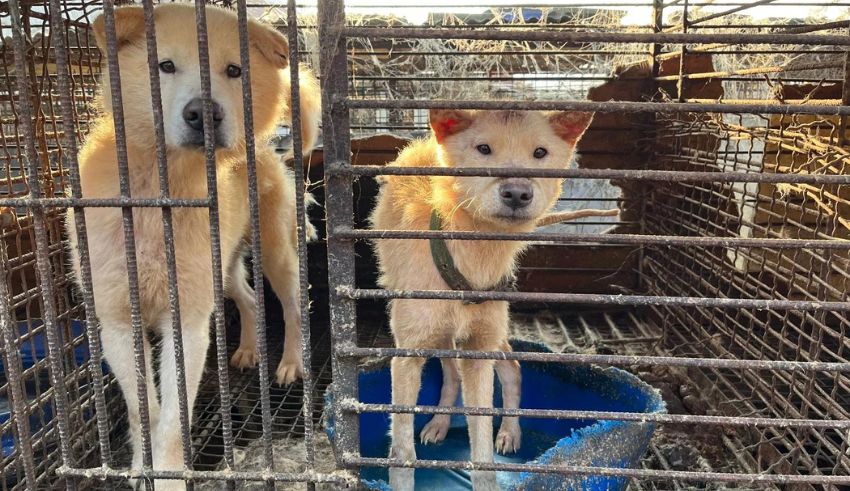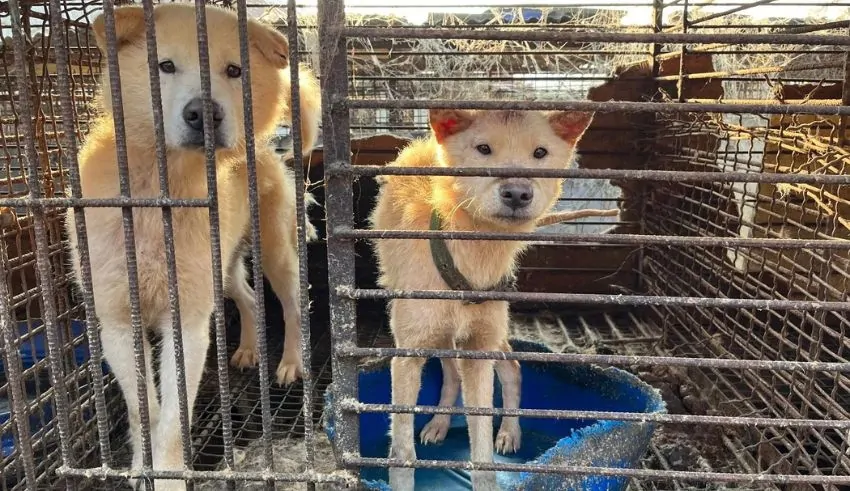

(C) Humane Society International
Significantly deviating from the centuries-old custom of dog meat consumption in South Korea, the government said on Thursday that it will pay dog farmers compensation to enable their departure from the business. This comes as the country prepares for the historic step to transfer about 500,000 bred for food and close down companies linked with the trade, effectively implementing a dog meat ban by 2027.
Dogs have long been a staple of South Korean cuisine, with up to a million killed annually for food at the height of trade. But dog meat intake has declined sharply as more individuals keep dogs in recent years. Particularly the younger generation views dogs as friends rather than animals, which supports growing public criticism against the practice.
January marked a turning point in South Korea’s attitude to animal rights when the parliament imposed a historic ban on dog breeding, killing, and sales for their meat. Under the rule, dog meat traders will face fines of up to 30 million won ($22,678) or penalties including up to three years in prison. According Thursday’s Agriculture Ministry notice, farmers who voluntarily halt their activities before the ban will be qualified for cash refund.
The government has put aside almost 100 billion won ($75.2 million) to assist close the 5,898 dog farms, slaughterhouses, restaurants, and other businesses linked to the dog meat industry. Eligible farmers will be paid anywhere from 225,000 won ($169) to 600,000 won ($451) depending on numerous criteria including the dog’s size and condition.
“We intend to urge farmers to voluntarily limit breeding,” the Agriculture Ministry said, “to actively lower the present population of roughly 466,000 dogs bred for food.” Through rewarding early closures, the government hopes to lower the quantity of dogs treated for meat before the official prohibition takes effect.
A major component of the government’s approach is preventing the killing or euthanasia of the dogs now bred for consumption prior to the ban. Officials are urging the public to adopt these dogs even as they try to place many of them in shelters where they can be safely cared for.
Apart from the salary scale, the government will grant low-interest loans to dog breeders and butchers so they may enter other agricultural businesses. Retail and food service companies reliant on the dog meat trade will also be qualified for subsidies, therefore allowing them to concentrate on other income sources. This all-encompassing approach is supposed to help the industry to be entirely closed and reduce the financial load on the farmers.
Not all the stakeholders find appealing in the ban. Concerns over the insufficient pay scale to help to counteract the financial repercussions have been expressed by dog growers. Many argue that the closing of their businesses will significantly change their way of life and that the government’s compensation does not appropriately reflect their financial losses.
“We cannot close our businesses for such a small amount,” said a group of dog farmers speaking to Agence France-Presse (AFP). Particularly those who have spent decades depending on trade, some farmers believe the ban infringes their personal liberties.
There is ongoing friction between dog farms and animal rights advocates even if the government’s compensation program is meant to help to lower some of the financial load. The later group argues that the ban is an unfair limitation on their capacity to pick their field of work and that the cultural significance of dog meat should not be discounted.
Public icons like President Yoon Suk Yeol and First Lady Kim Keon-hee help to explain why support for the dog meat ban has lately grown. President Yoon, an outspoken animal lover, has more than ten pets; the First Lady has been a staunch advocate of animal rights and opposes the brutal and out-of-date habit of dog meat eating. Their backing has given the movement political drive, therefore improving public opinion in favor of the ban.
As more South Koreans choose pets and view animals as family members, dog meat intake has altered. Particularly among younger generations, this cultural shift together with the growing influence of animal compassion groups have served to boost support of the ban.
The upcoming ban on dog meat indicates a dramatic shift in South Korea’s attitude toward animals, so separating from a once deeply ingrained cultural tradition. Reflecting changing society standards, the country is modernizing more precisely in line with international animal rights standards.
The government’s compensation and transition plan is a necessary first step towards a brighter future even if the road to 2027 will not be without challenges—especially with regard to the economic and cultural impact on farmers. By encouraging adoption and offering financial support, South Korea aims to ensure that this transformation happens as naturally as it should for all those involved.
Although South Korea’s ban on dog meat will likely generate debate as the world watches, it also represents a more general global trend toward giving animal welfare top attention and reevaluating traditional food sources in view of ethical concerns.
If you happen to breathe K-drama, then your 'May 2025' will most likely be well-rendered into a month! Romantic sagas,…
Since yesterday, May 2, 2023, at the Mall of Asia Arena in Pasay, Ahtisa Manalo has demonstrated her brilliance by…
“you’re nothing but a trying hard copycat” Character- Lavinia Arguelles Film- Bituing Walang Ningning (1985) Context- Lavinia confronts her rival…
During the first months of 2025 WWE released several prominent wrestlers who were part of their talent roster. Professional wrestling…
Seventeen year old sprint prodigy Rin Kubo continues to make athletic history in Japan. At the Shizuoka International Athletics Meet,…
NextRise 2025-the biggest startup and tech event in Asia-is ready to take place in Seoul on June 26-27 at COEX,…
This website uses cookies.
Read More